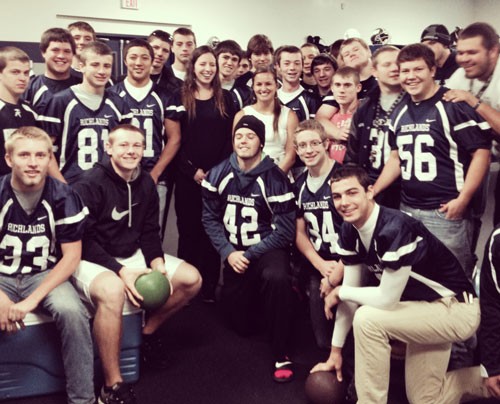Students promote health and wellness in the community
Good eating habits play a crucial role in wellness and health, and students in Radford University's Nutrition and Dietetics program ventured out into communities and schools last semester to spread awareness of healthy dietary practices.
The students were part of Jyotsna Sharman's community and cultural nutrition course, which teaches students how to assess and meet the nutritional needs of communities. Students in the class visited and worked with groups that included high school athletes and a ninth grade physical education class at Christiansburg High School.
The students also worked with a group at Montgomery Regional Hospital, the girls youth group at Dublin United Methodist Church, the food service staff at Radford Nursing and Rehabilitation Center and mothers of the Women's Resource Center of the NRV in Radford.
"The idea behind this service learning assignment is to give students an opportunity to apply nutrition information in a community setting" said Sharman, an assistant professor in the Nutrition and Dietetics program. "We feel that this kind of educational effort can really enable people to make healthy food choices, adopt healthy nutrition-related practices, change their eating behavior and enhance their nutritional well-being. The project involves planning, preparing and delivering an educational lesson, including a relevant hands-on activity, targeted to the specific needs of the communities."

Kirby Moir and Brittany Cromwell helped the Richlands High football team last fall learn more about proper game-day nutrition needs
The outreach also provided Sharman's students, all of which are seniors, an understanding of the applications of good nutrition. The fall semester project was a first in the class for Sharman. However, she hopes to continue the course assignment and possibly register it with RU's Scholar-Citizen Initiative.
For the project, Kirby Moir of Richlands and Brittany Cromwell of Virginia Beach trekked to Richlands High School to work with some of the school's sophomore, junior and senior athletes.
"We recognized that high school students do not typically receive information about proper nutrition," said Moir, who in 2010 graduated from Richlands High, where she played basketball and soccer. "When it comes to student athletes, this population has special fueling needs and we felt that providing education about basic nutrition information could be beneficial."
The duo gave presentations to the student-athletes on and number of topics, including the importance or a well-rounded diet, recognizing carbohydrates as a source of energy, hydration on athletic performance and which foods to eat before, during and after games and practices.
"We expressed to students that they trained for many hours to play their best in a game," Moir explained. "What may not be understood is that the foods consumed have just as much of an impact on performance as practice and conditioning. This is why we chose to discuss how to reach optimum performance levels by focusing on proper fueling."
LeeAnn Dye, along with three health peer educators, gave an interactive presentation about healthy eating for college-aged students in November at the national BACCHUS General Assembly in Reston.
"It was an absolutely amazing experience," said Dye, a Nutrition and Dietetics major from Richlands. "We were able to learn a lot about the things that college students really don't know, or have the wrong idea on, when it comes to nutrition, and even learn some new things that other campuses struggle with. Plus, we were also there to answer any questions the students from other schools had and give them ideas on how to implement a similar program on their campus."
For her project, Elizabeth Kane visited the Women's Resource Center of the New River Valley and taught a 30-minute lesson about eating healthy on a budget.
"What I learned from the experience is that many people know about food and nutrition, but cannot separate the facts from the myths," said Kane, a nutrition and dietetics major from Virginia Beach. "People want to eat healthy, but many do not know how or where to start when it comes to buying food. Also, the biggest problem with nutrition is the public thinks that it is too expensive to eat healthy, but in reality it is cheaper."
The experience of venturing out in the community and promoting good health and wellness benefits the students personally and professionally, Sharman said.
"On a personal level, the experience gave students an exposure in a community setting, helped them build confidence in their abilities and will certainly boost their application for dietetic internships," Sharman explained. "On a professional level as future dietetic professionals, they experienced how to apply their classroom learning, nutrition knowledge and communication skills to benefit a local community, and also learned how to effectively counsel and educate specific groups of communities and give sound nutritional advice consistent with the Dietary Guidelines for Americans."